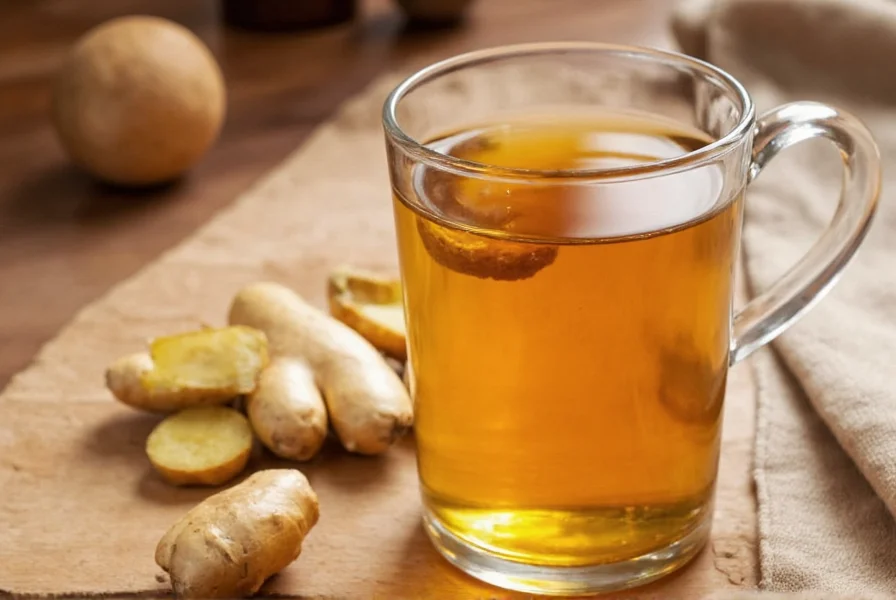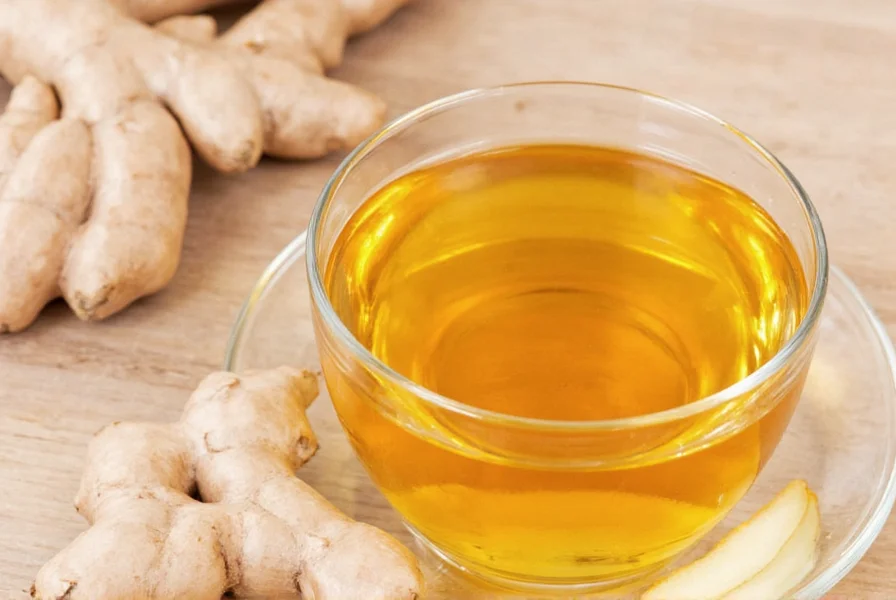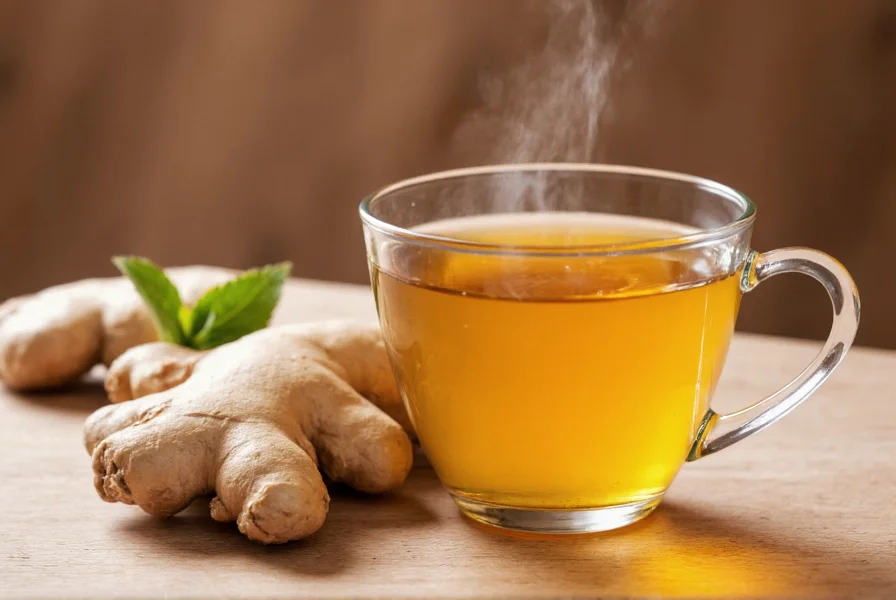Ginger tea has gained worldwide popularity not just for its warming, spicy flavor but for its impressive range of health-promoting properties. Unlike traditional teas derived from the Camellia sinensis plant, ginger tea qualifies as an herbal tisane, making it naturally caffeine-free and suitable for consumption at any time of day. The active compounds in ginger, particularly gingerols and shogaols, are responsible for most of its therapeutic effects, with research showing these compounds possess potent anti-inflammatory and antioxidant capabilities.
What Exactly Is Ginger Tea?
Ginger tea originates from the rhizome (underground stem) of the ginger plant, which grows in tropical climates worldwide but has its roots in Southeast Asia. Historical records show ginger's use dating back over 5,000 years in ancient Chinese and Indian medical systems. Unlike black, green, or oolong teas, ginger tea contains no tea leaves whatsoever—it's purely an infusion of ginger root in hot water.
There are several preparation methods for ginger tea:
- Fresh ginger tea: Made by slicing, grating, or crushing fresh ginger root
- Dried ginger tea: Prepared using dried ginger slices or powder
- Commercial blends: Often combined with other herbs like lemon, mint, or turmeric
- Fermented ginger tea: Less common preparation method with potential additional probiotic benefits
| Type of Ginger Tea | Preparation Time | Ginger Compound Concentration | Best For |
|---|---|---|---|
| Fresh ginger tea | 10-15 minutes | High (6-8%) | Digestive issues, nausea relief |
| Dried ginger tea | 5-7 minutes | Moderate (4-6%) | Daily consumption, mild flavor |
| Ginger-lemon tea | 8-10 minutes | Moderate-High | Immune support, cold symptoms |
| Ginger-turmeric tea | 12-15 minutes | High | Inflammation reduction, joint pain |
Science-Backed Health Benefits of Ginger Tea
Multiple clinical studies have investigated ginger tea's therapeutic potential, with particularly strong evidence supporting several key benefits:
Digestive Health Improvement
Research published in the World Journal of Gastroenterology demonstrates that ginger tea accelerates gastric emptying by up to 25%, making it highly effective for relieving indigestion and bloating. The active compounds in ginger interact with serotonin receptors in the digestive tract, reducing spasms and promoting smoother digestion. This natural remedy works particularly well for functional dyspepsia, a common digestive disorder affecting millions worldwide.
Nausea and Vomiting Relief
One of the most well-documented benefits of ginger tea is its ability to reduce various forms of nausea. A comprehensive review in Obstetrics & Gynecology found that ginger supplementation significantly reduced pregnancy-related nausea without adverse effects. Similarly, studies on chemotherapy-induced nausea show ginger tea can reduce symptom severity by 40% when consumed regularly before treatment.
Inflammation Reduction
Ginger's anti-inflammatory properties rival some pharmaceutical options without the side effects. A study in the Journal of Medicinal Food revealed that regular ginger tea consumption reduced markers of inflammation (like CRP) by 27% in participants with osteoarthritis. The gingerols in the tea inhibit the same inflammatory pathways targeted by NSAID medications, but through a more natural mechanism.
Potential Side Effects and Important Considerations
While ginger tea is generally safe for most people, certain populations should exercise caution:
- Pregnant women: While effective for morning sickness, consumption should be limited to 1 gram of ginger daily (approximately one cup of strong ginger tea) after the first trimester
- People on blood thinners: Ginger may enhance the effects of medications like warfarin due to mild anticoagulant properties
- Those with gallstones: Ginger may increase bile production, potentially causing discomfort
- Before surgery: Discontinue ginger tea at least one week prior to surgical procedures due to potential bleeding risks
The recommended daily intake for therapeutic benefits ranges from 1-3 grams of fresh ginger (approximately 1-3 cups of tea), though individual tolerance varies. Excessive consumption (more than 4 grams daily) may cause heartburn, diarrhea, or mouth irritation in sensitive individuals.
How to Prepare the Perfect Cup of Ginger Tea
Creating effective ginger tea requires proper preparation to maximize the extraction of beneficial compounds:
- Peel and thinly slice 1-2 inches of fresh ginger root
- Crush the slices slightly with the side of your knife to release more compounds
- Bring 8-12 ounces of water to a rolling boil
- Add ginger to boiling water (do not add to cold water)
- Simmer covered for 10-15 minutes (longer for stronger tea)
- Strain and add lemon or honey if desired
For optimal therapeutic benefit, consume ginger tea 20-30 minutes before meals to support digestion, or when experiencing nausea symptoms. The tea's effectiveness increases when prepared with freshly grated ginger rather than pre-packaged tea bags, as the volatile compounds degrade over time.

Ginger Tea in Traditional Medicine Systems
Ginger tea has played a significant role in traditional healing practices across multiple cultures:
- Ayurveda: Used as a "universal medicine" to balance all three doshas, particularly for improving agni (digestive fire)
- Traditional Chinese Medicine: Classified as a warming herb that moves qi and blood, often prescribed for cold conditions
- African traditional medicine: Employed for treating malaria symptoms and respiratory conditions
- Japanese Kampo medicine: Combined with other herbs to treat nausea and digestive complaints
These traditional applications have largely been validated by modern research, demonstrating the wisdom of these ancient healing systems. The consistent use of ginger across diverse medical traditions spanning thousands of years speaks to its fundamental therapeutic value.
Ginger Tea Versus Other Herbal Remedies
When comparing ginger tea to other popular herbal remedies, several distinctive advantages emerge:
- Peppermint tea: While both help with digestion, ginger specifically targets nausea more effectively
- Chamomile tea: Chamomile is better for relaxation, while ginger provides more active digestive support
- Turmeric tea: Ginger has faster-acting anti-nausea properties, while turmeric offers stronger long-term anti-inflammatory effects
- Echinacea tea: Ginger supports general immune function rather than targeting specific infections
Many health practitioners recommend combining ginger with other herbs for synergistic effects—ginger with lemon for immune support, or ginger with cinnamon for blood sugar regulation.

Conclusion: Incorporating Ginger Tea Into Your Wellness Routine
Ginger tea represents one of the most scientifically supported natural remedies available today. Its dual action on both digestive and inflammatory pathways makes it uniquely valuable for everyday wellness. Unlike many herbal remedies that lack robust scientific backing, ginger tea benefits are supported by numerous clinical trials across different populations and conditions.
For optimal results, incorporate 1-2 cups of freshly prepared ginger tea into your daily routine, particularly before meals if you experience digestive discomfort. Remember that while ginger tea offers significant health benefits, it works best as part of a comprehensive approach to wellness that includes balanced nutrition, regular exercise, and adequate sleep.
Frequently Asked Questions
How much ginger tea should I drink daily for health benefits?
For therapeutic benefits, most studies recommend 1-3 grams of fresh ginger daily, which equates to 1-3 cups of properly prepared ginger tea. Start with one cup daily and gradually increase to assess your tolerance. Exceeding 4 grams of ginger daily may cause digestive discomfort in some individuals.
Can ginger tea help with morning sickness during pregnancy?
Yes, multiple clinical studies confirm ginger tea's effectiveness for reducing pregnancy-related nausea. Research shows consuming 1 gram of ginger daily (approximately one strong cup of tea) after the first trimester significantly reduces nausea symptoms without adverse effects. Always consult your healthcare provider before using ginger tea during pregnancy.
When is the best time to drink ginger tea for digestion?
For optimal digestive benefits, drink ginger tea 20-30 minutes before meals. This timing allows the ginger compounds to stimulate digestive enzymes and prepare your gastrointestinal tract for food. You can also drink it after meals if experiencing bloating or indigestion, though pre-meal consumption provides more preventative benefits.
Does ginger tea interact with any medications?
Ginger tea may interact with blood-thinning medications like warfarin due to its mild anticoagulant properties. It might also enhance the effects of diabetes medications by lowering blood sugar. If you take medications for heart conditions, diabetes, or blood pressure, consult your healthcare provider before regularly consuming ginger tea.
How long should I steep ginger tea for maximum benefits?
For maximum extraction of beneficial compounds, steep fresh ginger in boiling water for 10-15 minutes. Longer steeping times (up to 20 minutes) will increase potency but may make the tea overly spicy for some palates. Dried ginger requires less steeping time (5-7 minutes) as the compounds are more readily released. Always cover the tea while steeping to prevent volatile compounds from evaporating.











 浙公网安备
33010002000092号
浙公网安备
33010002000092号 浙B2-20120091-4
浙B2-20120091-4